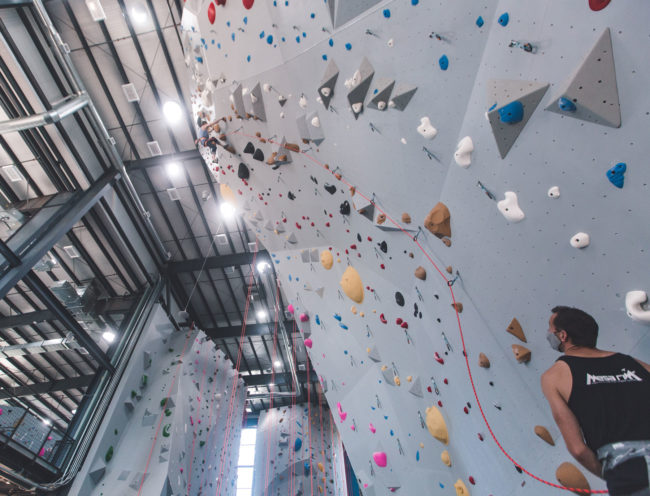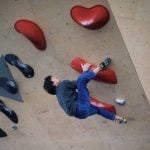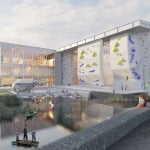
[Branded Content]
The year of 2020 began with projections for more new climbing gyms to open than in any previous year. 75 new climbing facilities were slated to open across the United States. In the end, that figure was greatly reduced due to the COVID-19 pandemic, but 44 new gyms still managed to open throughout the country, with extra health measures in place.
In mid-March, Mesa Rim Climbing Centers was halfway through construction of one of those new facilities, its fifth and largest climbing gym, located in San Marcos, California. Then the pandemic hit. California’s governor, Gavin Newsom, issued a stay-at-home order and indoor businesses, like restaurants and climbing gyms, were forced to close out of concern for the public’s safety.
A Challenging Time
These closures were difficult for numerous businesses, and climbing gyms were no exception. Pre-Covid, Mesa Rim employed around 170 people at four gyms, three in San Diego, California, and one in Reno, Nevada. A couple months into the pandemic shutdown, Mesa Rim had to make the extremely difficult decision to categorically lay off almost all of their part-time employees―which was half of their work force―in order to be able to stay afloat.
In August 2020, the state of California introduced a tiered reopening system based on positive test rates in each county (and most recently, ICU capacity). Under this system, counties are assigned a color-coded tier (purple, red, orange, yellow) which determines the rules and capacity levels at which businesses and industries can reopen. For climbing centers, that has often meant opening and then closing again as case rates fluctuate. “In San Diego we have closed three times, reopened twice, and are waiting for our third reopening,” Mesa Rim CEO Ian McIntosh said.
Meanwhile, since construction was labeled an essential business, progress on the company’s North City gym in San Marcos was allowed to continue. “There were a lot of modifications to the job site,” McIntosh said. “Richard and Richard, our construction company, and EP, our climbing wall fabricator and installer, took important steps to ensure the safety of the job site and practice social distancing.”
“Our installation crews are a tight knit group in the best of times, but the pandemic forced our North City crew to become a tight-knit quarantined pod, living, eating and working together to stay healthy and within local regulations,” said Bryce Benge, EP Director of Project Management. “We lived under one roof and quarantined from the outside world while not at the construction site. This allowed us to continue work while other trades were forced to reduce work forces or stop work altogether. ”
Due to these careful work practices, the North City location was completed and opened in October, only a little bit behind its original schedule.

Professional Partnership
One of the main factors that contributed to finishing the new location on time was the successful relationship between EP and Mesa Rim. “As we work with our clients, we become familiar with each other’s wants, needs, and business culture, making it easier and more efficient to relay information and assure a successful outcome,” said Sander Culliton, CEO of EP. “This also nurtures a higher degree of trust and long-term loyalty and creates a natural brand advocate for each organization.”
This high degree of trust between companies translated to success despite the challenges that came during 2020. “EP was an amazing partner to have through all this,” McIntosh said. “They realized we’re all in this together. They hit some delays that were not caused by them, but they were able to adapt and modify what they were doing to meet the challenges. And we got through it.”
“The North City installation crew came together during a pandemic to not only successfully construct one of the premier climbing gyms in the country, but to do it under extenuating circumstances and while staying healthy throughout the duration of the project,” Benge said.
When Mesa Rim built it first gym in Mira Mesa, California, the company partnered with a different wall fabricator. For every gym since, Mesa Rim has partnered with EP. “Not only do we think they’re the best wall builder, but ultimately we continue to work with EP because of the relationship we have built. They’re a great partner and they’re going to work with us through whatever challenges arise in the course of construction,” McIntosh said. “No one could have foreseen a pandemic when we started this project, and we couldn’t be happier that we were with EP. They lived up to every expectation we could have.”

More Desire for a Shared Climbing Space Than Ever
Even though staying open and in business has been difficult for climbing gyms country-wide, Mesa Rim remains dedicated to its mission of providing an inclusive and supportive space for climbers of all levels and abilities. McIntosh does not think the gym customer base has gone away. In fact, he thinks there might be more of a desire for climbing than ever.
“The majority of our member base is chomping at the bit to get back in the gym, and it’s not to just try and climb hard and send their projects. It’s really because they miss the space and the feel of being around a lot of other people in that shared pursuit of pushing boundaries and supporting each other,” McIntosh said. “I think we’re really seeing a deterioration of shared public space right now. It’s a basic human need to be part of a community.”
Sociologists have a theory of a “third place,” a place other than home or work that becomes central to community and social connection. A third place can be anywhere that people gather on a regular basis, such as a park, church, cafe or bookstore. Climbing gyms also serve as a third place for many people, providing an opportunity for community building and a sense of belonging.
“The basic value that we provide is healthy recreation in a shared space,” McIntosh said. “The need for that is not going away. If anything, it will be stronger after COVID. With the absence of access to gyms, a core group of people have definitely realized how much they value that third space, that home away from home.”

Moving Forward
Because this need for a shared community space is not going away, Mesa Rim is not scaling back plans for growth despite the difficulties of 2020. A new facility in Austin, Texas, has already been designed and permitted, with a projected opening in early 2022. EP has begun fabrication of this new gym’s climbing walls.
The partnership between Mesa Rim and EP reinforces the mission of building facilities that can become social hubs. The relationship between the two companies is based on trust, loyalty and communication, which are central elements to a community that meets in an accessible shared space. The communities that form at gyms start with the community forged by the industry behind the gyms.
“Our decision to continue to work with EP is so much more than the climbing walls themselves,” McIntosh said. “It’s the entire process and working relationship around how a climbing gym is conceived, designed, engineered, fabricated, installed, and then actually used for the next 20 to 30 years by our members…I’m very confident that the need for community and healthy recreation in supportive spaces is going to be stronger than ever.”












